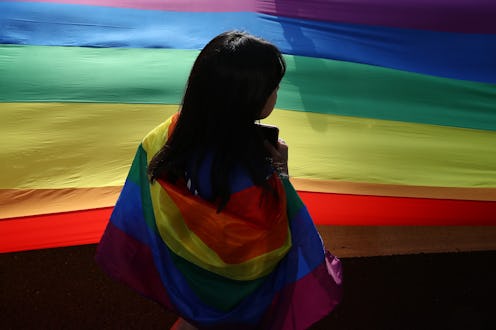
As countries around the world host Pride month celebrations, Ecuador just legalized same-sex marriage in what has been a historic week for LGBTQ rights. On Wednesday, Ecuador's highest court ruled in favor of two gay couples who filed lawsuits after the country's civil registry refused their requests to get married, Reuters reported. Ecuador's legalization of same-sex marriage comes not long after Botswana's decriminalization of gay sex and Bhutan's efforts to do the same.
According to CNN, the Quito constitutional court judges in Ecuador ruled five to four in favor of marriage equality. These judges argued that Ecuador's current marriage laws were discriminatory and unconstitutional, and they called for equal rights for same-sex couples. For the past decade, same-sex unions have been permitted in Ecuador, the Associated Press reported, but same-sex couples in civil unions have not been granted as many rights as married couples, especially in regards to inheritance and estate laws.
Now that Ecuador's top judges have ruled in favor of marriage equality, the constitutional court has 10 days to inform local government offices of their ruling, per CNN. After that, same-sex couples will be able to get married, even before Ecuador's National Assembly officially changes the country's marriage laws. One of the plaintiffs in the case, Efraín Soria, told the AP that he and his partner Xavier Benalcázar would immediately begin planning their wedding following the ruling.
According to Reuters, Ecuador is the 27th country to legalize same-sex marriage. Ecuador's marriage equality ruling came just one day after Botswana's High Court decided to overturn colonial-era laws that criminalized homosexuality, per The New York Times. And less than a week before Ecuador's legalization of same-sex marriage, Bhutan's lower house voted to repeal certain sections of the country's penal code, paving the way for the decriminalization of homosexuality.
As a result of Wednesday's ruling, Ecuador joined five other Latin American countries — Argentina, Brazil, Costa Rica, Colombia, and Uruguay — in legalizing same-sex marriage, the AP reported. Despite recent victories in Ecuador, Botswana, and Bhutan, however, LGBTQ rights advocates have also drawn attention to the fact that other countries are still facing challenges.
In May, Kenya's High Court upheld laws criminalizing gay sex, The New York Times reported, instead of joining other countries that have overturned such British colonial era laws. And in the United States, the Trump administration has rolled back many protections for LGBTQ people, in areas ranging from health care to the military.
Activists in Ecuador faced numerous obstacles in their efforts to make marriage equality a reality. The church is a very influential force in Ecuador, Reuters reported, and a right-wing Christian group called the Life and Family movement spearheaded a significant amount of opposition to the legalization of same-sex marriage.
Opponents of same-sex marriage in Ecuador, including the four judges that voted against it this week, argued that the country's lawmakers — rather than the court — should be tasked with making changes to Ecuador's constitution, which currently defines marriage as between a man and a woman. Ecuador's National Assembly will still have to officially change how the law defines marriage, CNN reported, but the court's ruling is binding and therefore enables same-sex couples to start getting married soon.